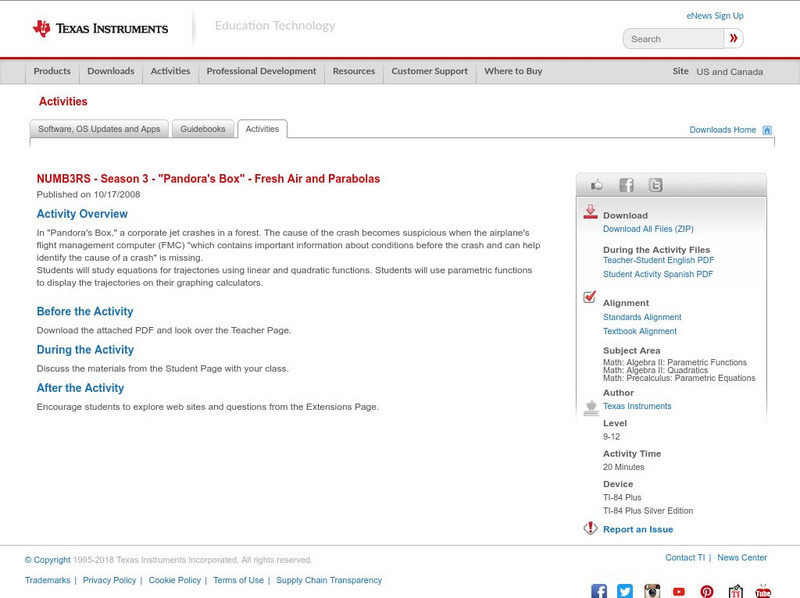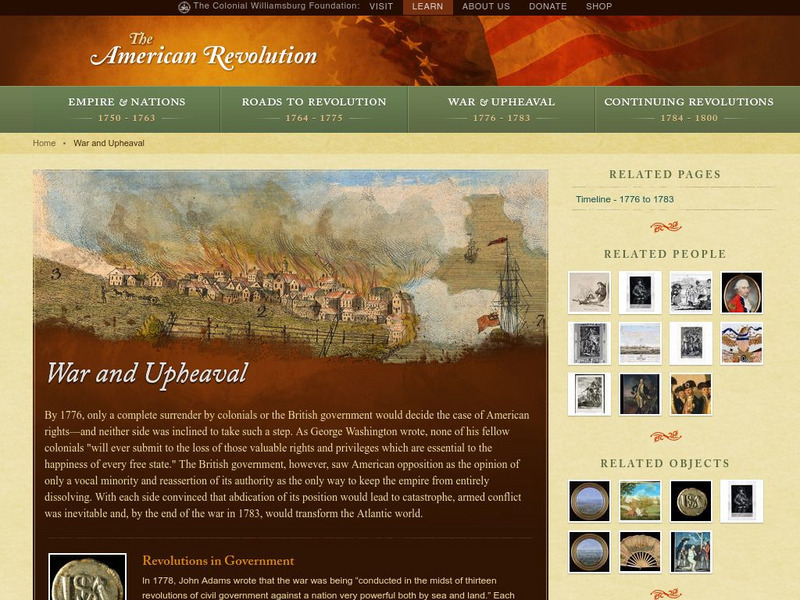Hi, what do you want to do?
Curated OER
Drag Problem Set
Learners read an explanation from a NASA Web-based textbook and then demonstrate an understanding of the text by applying it to calculating drag of both full-sized and model gliders.
Curated OER
Did You Catch My Drift?
Students, through the use of the Curveball interactive software package, become familiar with the way in which the flow of air across or around an object affects its ability to lift, spin, and curve. After reading the explanation given...
Curated OER
Satellite Tracker
Students use satellite tracking software to monitor different satellites. They predict and graph the motion of the space station. They create a 3-D display of its path and share it with the class.
Curated OER
Tiger Woods Physics
Students comprehend the independence of vertical and horizontal velocity vectors. They calculate height, time of flight and range of projectile objects. Students perform derivation for range of same plane projectile motion. They perform...
Curated OER
Curveball vs. Fastball
Students graph the relationship between the release point and the final position of curveballs and fastballs thrown by both right and left handers given a constant speed, and explain the relationships illustrated by the graphs of data.
Curated OER
Murder Mystery
High schoolers examine how to capture foot prints while they simulate a criminal investigation. They discover how the clues are needed for identifying or eliminating murder suspects.
Curated OER
Paper Rockets
Students create rockets to test stability. In this rocketry lesson, students discover how rockets fly through air as they follow the procedures included in this activity.
Curated OER
Targeting an Action
Students explore how the brain how the brain infers the position of a moving target. They investigate how the brain can fine-tune its motor control over the muscle groups that will perform the intended action. Students participate in a...
Curated OER
Planet Impact
Young scholars use their knowledge to crash a comet into Jupiter or make a comet fly past the planet without colliding with it.
Curated OER
Thomas Jefferson
In this online interactive history worksheet, students respond to 10 short answer and essay questions about the accomplishments of Thomas Jefferson . Students may check some of their answers on the interactive...
Curated OER
Aerodynamic drag
Students construct a device that can launch spinning balls. One example would be a mailing tube with one side partially cut away, lined with sandpaper. Styrofoam balls should be used for the greatest effet. They are explained how a...
Curated OER
Displacement Problem Set
Students calculate the length of a side of a triangle using a trigonometric function. They calculate the measure of an angle given two sides of a triangle with a trigonometric function.
Texas Education Agency
Texas Gateway: Kinematics in Two Dimensions: Projectile Motion
By the end of this section, you will be able to identify and explain the properties of a projectile, such as acceleration due to gravity, range, maximum height, and trajectory; determine the location and velocity of a projectile at...
University of Colorado
University of Colorado: Ph Et Interactive Simulations: Fluid Pressure and Flow
Explore pressure in the atmosphere and underwater. Reshape a pipe to see how it changes fluid flow speed. Experiment with a leaky water tower to see how the height and water level determine the water trajectory. Java required.
Physics Classroom
The Physics Classroom: Vectors and Projectiles: Projectile Simulator
Students explore a variety of variables associated with the trajectory of a projectile including the launch height, angle, and speed. This interactive can be used as a purely exploratory activity or be used with an activity sheet that...
Physics Classroom
The Physics Classroom: Vectors and Projectiles: The Monkey and the Zookeeper
In this simulation, students pretend to launch bananas from a canon to the monkeys at the zoo. The monkeys sometimes let go of the branch at the exact moment the banana is launched. So the students must determine the correct aim angle...
Texas Instruments
Texas Instruments: Numb3 Rs: Fresh Air and Parabolas
Based off of the hit television show NUMB3RS, this lesson examines a plane crash, and gets students to try to find the location of various pieces of wreckage. This is done using parametric equations which form a parabolic trajectory....
Physics Classroom
The Physics Classroom: Circular and Satellite Motion: Energy in Satellites
Through interactive practice problems and illustrated examples, students explore energy relationships for satellites.
Other
The Colonial Williamsburg Foundation: War and Upheaval
Follow the trajectory of the Revolutionary War through this synopsis that is broken down into five themes. Read about the Declaration of Independence, the turning points of the war, other countries that supported the war, and how...
Physics Classroom
The Physics Classroom: Vectors Motion and Forces in Two Dimensions
Three complete tutorials on vectors and two dimension forces and motion. Lessons include informational text, interactive activities, animations, and quick, interactive comprehension checks along the way.
Physics Classroom
The Physics Classroom: Motion/forces in Two Dimensions: Projectile's Trajectory
This illustrated tutorial discusses the horizontal and vertical components of a projectile's motion; specific attention will be given to the presence/absence of forces, accelerations, and velocity.
Other
Ubc Calculus Online Homepage: Orthogonal Trajectories
Interactive site where the student can change the position of the orthogonal trajectory and see the result.
Texas Instruments
Texas Instruments: Space Trajectories
In this activity, students will explore different models for the motion of satellites. They work with two-and three-body problems, and consider both artificial and natural satellites.
American Association of Physics Teachers
Com Padre Digital Library: Open Source Physics: Ballistics and Orbits Model
Experience a simulation of ballistic trajectories in relationship to Earth's orbit. Java 1.5 or more recent is required.
























